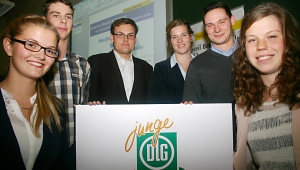The DLG backs newcomers in the agriculture industry

"We arrived at our career aspirations in completely different ways. Some want to join the farm of their parents and certainly to run it at some point. Others develop the wish to study the industry after a holiday placement in an agricultural business. Some are particularly interested in the scientific side of arable farming or animal husbandry," says Lisa Bahrenthien and adds that she can imagine joining the agricultural management of a company.
The 21-year-old from Halle is studying at the Martin-Luther-University of Halle-Wittenberg, in the German federal state of Saxony-Anhalt, where agriculture sciences and food sciences have been taught for more than 150 years. At present, however, agriculture's reputation is more than ever exposed to public criticism. Buzzwords such as antibiotics, pesticides, animal cruelty and genetic engineering are circulating in the opinion-forming media. "Very often in a negative light," feel the students at the agricultural campus in Halle an der Saale. They are passionate about the career for which they are currently studying and are at the same time aware that its public image is suffering.
In order to support the new blood in its positive attitude to the agricultural and food business, the German Agricultural Society DLG is promoting "young DLG" teams. They work voluntarily and are composed of committed students, career entrants, young entrepreneurs and scientists up to the age of 36. They exchange information among each other, are active externally, obtain input from practice and for their part develop ideas and impetuses.
There is also such a "young DLG" at the Martin Luther University Halle-Wittenberg. It currently consists of 20 active "networkers" who meet in discussion groups and educate themselves further at trade fairs, organise tours of businesses and excursions, and hold lectures and panel discussions. "While doing this, we learn to look at current topics in a professional way and at the same time practice appearing in public," says Lisa Bahrenthien. She is rather nervous because their big information event will be starting soon. The "young DLG" team has conceived and organised this annual high point of its work independently.
"Between Myth and Reality – Public Criticism of Foodstuff Production" is the subject. Invited are students, regional businesses from the industry, friends of the university and also interested members of the public. The auditorium in the Institute of Agricultural and Food Sciences is fully occupied – from students, young parents with babies to the elderly, people are interested in having an in-depth look into the subject at precisely this place, where expertise is expected.
The agricultural newcomers of today and tomorrow face the urgent question of how it is possible to win back a positive image for their occupation and for their business, and of how they can make an objective and convincing contribution to debates that are conducted in a highly emotional way. The "young DLG" team from Halle searched for and found speakers who give answers. The Henkes, for example, a young farming family. These "piglet farmers out of conviction" run a large operation in Bruchhausen-Vilsen in Lower Saxony and sell their animals within the region, in order to spare them long transport routes. "We have made the decision not only to react to current events, but to also act ourselves," says vet Nadine Henke. She and her husband exemplify a young generation of farmers who are less wary of the new media. Their pig farm has a page on Facebook and opens its sty doors not only to the public, but also for radio and television. They are thereby consciously facing the challenge of communicating with consumers and critics. "This way we can explain ourselves and address opinions and incidents directly," says Nadine Henke and wants to encourage her future colleagues – on the basis of her predominantly positive experiences – not to shun publicity.
One young company from Saxony-Anhalt is "Wittenberg Gemüse" GmbH, founded one year ago. "After such a short time, you do not yet have a well-known name on the market," says Sales Manager Kevin van IJpaeren. He reveals to the public the journey of tomatoes from the greenhouses of Wittenberg into the consumer's shopping basket – and also utilises the new media. His entrepreneurial advice: "You have to emphasise the strengths that convince the customer." The tomatoes in the greenhouses in Wittenberg ripen under daylight, using carbon dioxide and heat from the nearby Piesteritz nitrogen works to grow. Bumblebees provide the pollination and insects the pest control. And what is more: the tomatoes are harvested ripe. IJpaeren knows from consumer surveys that "regionality, pureness and freshness are important sales arguments."
The students are annoyed that debates about food health are often conducted without objectivity. And they know that they themselves will sooner or later come into contact with such campaigns. The "young DLG" team has invited a quality expert from Südzucker AG. Because the example of sugar allows one to show particularly clearly that sometimes, a foodstuff only comes into disrepute due to consumers' eating habits. Thorsten Bruß confirms that "the purity of the sugar is at least 99.7 percent." He regards good risk management of the value chain from the field into the sugar bag as strong evidence when it comes to finding convincing arguments for foodstuffs. What can be proven is that "the fact that sugar can make people ill is not something for which the beet growers or sugar industry are responsible, but instead the consumers," says Bruß.
Many questions, quite a number of opinions expressed, insights gained – the "young DLG" team is happy about the positive reaction to its event. "And I didn't yet know that tomatoes shouldn't be kept in the fridge either," Lisa laughs.
Author: Kathrain Graubaum (text/photo)
Picture Caption: Members of the "young DLG" team in Halle are Vroni Hentschel, Kevin Ködel, Florian Eißner, Laura Grütter, Thomas Döbelt, Lisa Bahrenthien (left to right).
